Roundup Alternatives
Roundup alternatives without glyphosate are available and can be effective. Organic brand options use naturally occurring oils or acids. Some alternatives can even be made with household ingredients. Alternative farming and gardening methods may also be used.
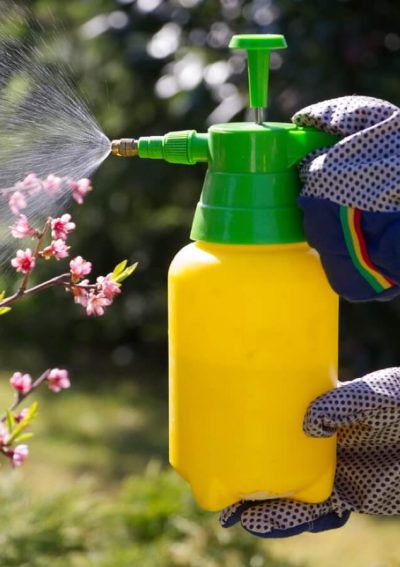
Roundup Alternatives for Your Lawn and Garden
There are several glyphosate alternatives for controlling weeds in your garden, but not all options are ideal in all situations. You may need to try different alternatives for the various areas of your lawn and garden.
Interest in alternatives to Roundup has grown as concerns about health risks with glyphosate mount. The United Nation’s International Agency for Research on Cancer has declared the chemical a probable cause of cancer. In the U.S., the Environmental Protection Agency, however, maintains glyphosate is not likely to be carcinogenic.

Natural alternative such as manually digging up weeds at the root may be the most effective way to get rid of them. Putting down a 2- to 3-inch layer of mulch will block sunlight weeds need to sprout and will suffocate weeds under the weight of the mulch.
A handful of iron-based weed killers are EPA-approved. Broadleaf weeds absorb iron more easily and in higher amounts than the grass in your lawn. As the iron oxidizes, it kills weeds within just hours after applying it.
Organic Alternatives to Roundup
Organic herbicides typically use natural oils or acids. These products are most effective when weeds are still small and less effective as weeds get older, according to a University of California Division of Agriculture and Natural Resources study.
The study also found that organic weed killers were 60% to 100% effective if used in high volume against certain weeds before they were 12 days old. They were less than 40% effective if used on broadleaf weeds after 26 days.
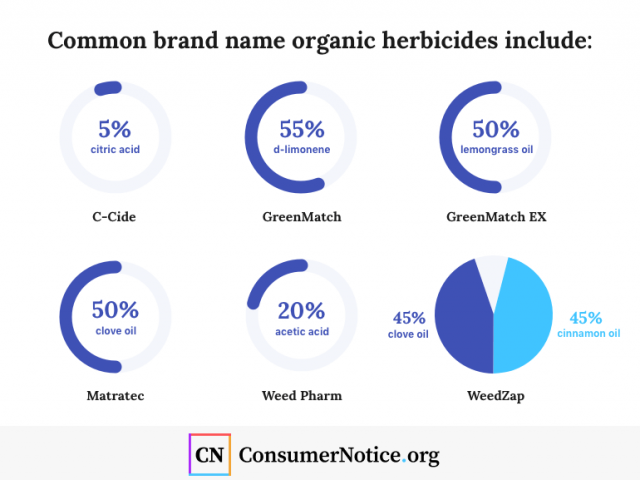
Herbicidal soaps are also popular Roundup alternatives that use fatty acids to kill weeds. Corn gluten meal can also kill grass weeds and broadleaf weeds. Spreading 20 pounds for every 1,000 square feet of garden and waiting five days before watering the area should kill weeds for up to six weeks.
Home Recipe for a Roundup Alternative
DIY Roundup alternatives can be made using easy-to-find household ingredients, but exercise caution. Even natural or organic ingredients can kill plants you want to protect, damage your soil or have negative health effects.
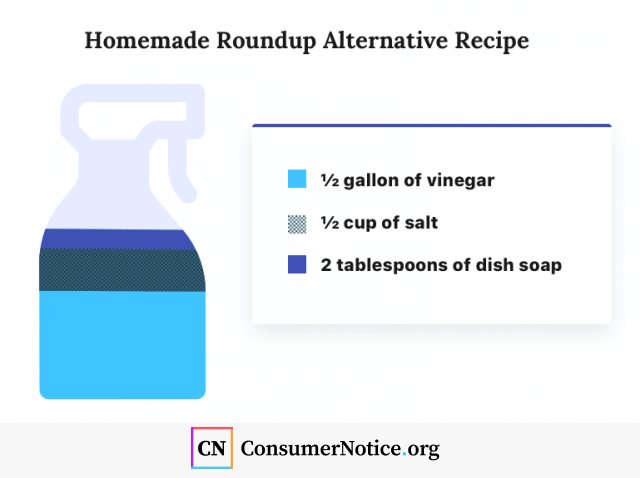
Researchers at North Dakota State University tested a popular vinegar, salt and soap homemade herbicide formula in 2014. They found it was effective at killing small annual weeds. It didn’t work very well on large annual weeds or perennials. Annuals are plants that only live a year. Perennials are those that live two years or more, coming back each year.
The mixture can still be toxic to humans and animals if swallowed. Based on animal tests, the researchers estimated that a gallon of the salt and vinegar concoction was nearly 10 times more toxic than the store brand glyphosate they tested it against. So it should be stored away from children and pets.
Using Vinegar in Roundup Alternatives
Some products contain industrial vinegar, for example, which contains much higher levels of acetic acid than the vinegar you’ll find for use in kitchens. Acid-based herbicides burn some young weeds, but can also burn other plants around them.
For those looking for alternatives because of Roundup and cancer concerns, it’s important to note that vinegar made from genetically modified crops may contain glyphosate. Most vinegar is made with corn and most corn in the U.S. is grown from Roundup Ready seed.
So the vinegar you are using to spray your weeds is probably made from corn that was sprayed with glyphosate: the very herbicide you were trying to avoid.
Roundup Ready crops were genetically modified to be resistant to glyphosate. This resistance allows farmers to continue widespread use of Roundup on their crops as they mature to prevent weeds.
Using certified organic vinegar may help ensure your Roundup alternative is free of glyphosate. Some vinegars are made from apple cider, wine and grape juice, such as balsamic vinegar. Typically corn-based vinegar is used to kill weeds, but all vinegar includes acetic acid, which can kill weeds.
Roundup Alternatives for Farming
With concerns about damage from windblown glyphosate to other crops and the rise of Roundup resistant weeds, farmers have sought effective alternatives. Farmers are also at higher risk of health effects from regular exposure to significant amounts of glyphosate.
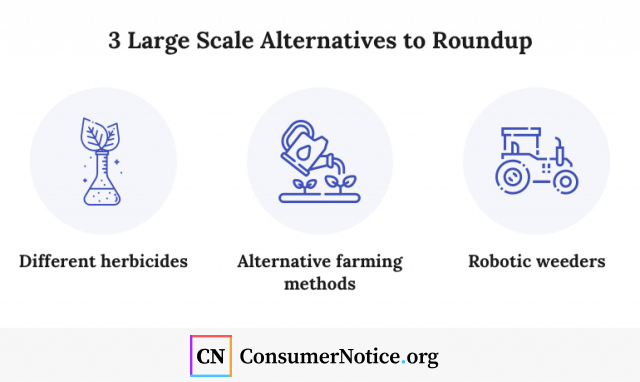
The first Roundup-resistant weeds cropped up in a Delaware soybean field in 2000 and have been a growing problem ever since. By 2014, at least 24 species of weeds had developed a resistance to glyphosate.
Biopesticides and Herbicide Research
One effective Roundup alternative for farmers may be biopesticides, a staple of organic farming. They’re made of naturally occurring substances found in plants, animals, minerals, fungi and bacteria. The EPA reported more than 18 million acres were being treated with biopesticides in 2015.
Bayer AG, the drug and chemical company that makes Roundup, promised in June 2019 to spend $5.6 billion over the next 10 years on herbicide research. More than 13,000 Roundup lawsuits claiming the pesticide caused non-Hodgkin lymphoma or other cancers have been filed in courts around the United States.
In 2021 the company also said it would pull glyphosate from consumer products in 2023. Though currently glyphosate-based Roundup products are still widely available in retail stores and online.
Some farmers have used an older pesticide called dicamba. Like Roundup and Roundup Ready seeds, this pesticide can be sprayed on crops that have been genetically modified to be resistant to it while killing the weeds around them. But it’s believed to be responsible for destroying 3.6 million acres of unprotected crops in 2017 alone when it drifted.
Alternative Farming Techniques
Crop rotation — changing the crops grown in a field from season-to-season or year-to-year — can break up weeds’ growth and reproductive cycles. Growing cover crops that protect and enrich the soil during the rotation also helps.
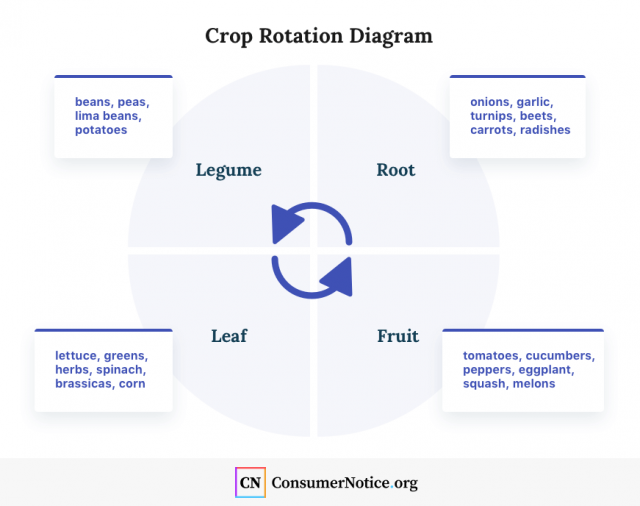
Physical weed control uses brute force against weeds. Mechanical weeders pulled behind tractors can rip weeds out between rows. Thermal weeding uses flames, steam or hot water sprayed onto weeds to kill them with heat.
Robotic Weeding
French company Naio Technologies has been testing its Dino weeding robot in the U.S. The company says the electric robot can cover 12 acres in eight hours on its own.
The person operating the robot types in instructions, such as field and crop row dimensions, on the four-wheeled robot’s controls. It then uses GPS and cameras to move through the field using cultivator blades to rip up weeds.
We see these herbicides eventually being used commercially with camera-based precision applicators that ‘see’ weeds and deliver herbicides only to the weeds, not to the crop or bare ground.
W. Thomas Lanini of the University of California reported on research into organic herbicides. He noted that coupling robots with organic herbicides could potentially be an economically and environmentally friendly combination.
Solar-powered ecoRobotix, for example, uses artificial intelligence and cameras to navigate and identify weeds as it passes over. Two robotic arms spray pesticide precisely on weeds, using 20 times less herbicide than conventional sprayers.
19 Cited Research Articles
Consumernotice.org adheres to the highest ethical standards for content production and references only credible sources of information, including government reports, interviews with experts, highly regarded nonprofit organizations, peer-reviewed journals, court records and academic organizations. You can learn more about our dedication to relevance, accuracy and transparency by reading our editorial policy.
- Barker, A.V. and Prostak, R.G. (2008, July). Herbicide Alternatives Research. Massachusetts Office of Transportation and Public Works. Retrieved from https://www.mass.gov/doc/herbicide-alternatives-research/download
- Bloch, S. (2019, May 2). Robotic Weeders Are Racing to Replace Glyphosate and Dicamba. The New Food Economy. Retrieved from https://thecounter.org/robot-weeders-glyphosate-dicamba-herbicide-replacement/
- Duke, S.O. and Bowles, S.P. (2008, February 13). Glyphosate: A Once-in-a-Century Herbicide. Pest Management Science. Retrieved from https://onlinelibrary.wiley.com/doi/abs/10.1002/ps.1518
- Heap, I. (2014, January 15). Global Perspective of Herbicide-Resistant Weeds. Pest Management Science. Retrieved from https://www.ncbi.nlm.nih.gov/pubmed/24302673
- Lanini, W.T. (n.d.). Organic Herbicides – Do They Work? University of California, Division of Agriculture and Natural Resources. Retrieved from http://ucnfanews.ucanr.edu/Articles/Feature_Stories/Organic_Herbicdes_-_Do_They_Work/
- Lyon, N. (2018, November). Could this New Herbicide Be an Alternative to Glyphosate? 400M Forum. Grain Central. Retrieved from https://www.graincentral.com/news/could-this-new-herbicide-be-an-alternative-to-glyphosate-400m-forum/
- Murphy, J. (2013, July 27). Are There Organic Alternatives to Glyphosate? Rutgers University. Retrieved from https://plant-pest-advisory.rutgers.edu/are-there-organic-alternatives-to-glyphosate/
- Naio Technologies. (n.d.). Autonomous Vegetable Weeding Robot – Dino. Retrieved from https://www.naio-technologies.com/en/agricultural-equipment/large-scale-vegetable-weeding-robot/
- Neal, J. and Senesac, A. (2018, October 2). Are There Alternatives to Glyphosate for Weed Control in Landscapes? North Carolina State University. Retrieved from https://content.ces.ncsu.edu/are-there-alternatives-to-glyphosate-for-weed-control-in-landscapes
- Nowak, C.A. (2014, February). Testing the Efficacy of Alternatives to Herbicides in Controlling Undesirable Plants on NYSDOT Roadside Rights-of-Way. New York State Department of Transportation. Retrieved from https://www.dot.ny.gov/divisions/engineering/technical-services/trans-r-and-d-repository/C-06-24%20TASK%203%20%201%20%20NYSDOT%20NATURAL%20HERBICIDES%20FIELD%20TESTS.pdf
- Patton, D. (2019, May 31). Weeding Tips: From Mulching to Roundup, There’s No Best Way to Control Them. The Kansas City Star. Retrieved from https://www.kansascity.com/living/liv-columns-blogs/kc-gardens/article231034533.html
- Pesticide Action Network Europe. (2017). Alternative Methods in Weed Management to the Use of Glyphosate and Other Herbicides. Retrieved from https://www.pan-europe.info/sites/pan-europe.info/files/public/resources/reports/Alternative%20methods%20in%20weed%20managment%20to%20glyphosate_PAN%20Europe_III.pdf
- Rose, M.T. et al. (2016). Advances in Agronomy. Science Direct. Retrieved from https://www.sciencedirect.com/topics/agricultural-and-biological-sciences/glyphosate
- Scolaro, C.M. (2018, June 4). This weed-killing AI Robot Can Tell Crops Apart. CNBC. Retrieved from https://www.cnbc.com/2018/06/04/weed-killing-ai-robot.html
- Smith-Fiola, D. and Gill, S. (2017). Vinegar: An Alternative to Glyphosate? University of Maryland. Retrieved from https://extension.umd.edu/resource/vinegar-alternative-glyphosate
- U.S. Environmental Protection Agency. (2015, February 2). Farmers Shift Towards Virtually Non-Toxic Alternatives for Pest Control. Retrieved from https://blog.epa.gov/2015/02/02/farmers-shift-towards-virtually-non-toxic-alternatives-for-pest-control/
- U.S. Environmental Protection Agency. (n.d.). Design for the Environment Logo for Biopesticide Products. Retrieved from https://www.epa.gov/pesticide-labels/design-environment-logo-biopesticide-products
- Wilen, C. (2012, January 3). Natural Herbicides: Are They Effective? University of California Agriculture and Natural Resources. Retrieved from https://ucanr.edu/blogs/blogcore/postdetail.cfm?postnum=6498
- Zollinger, R., Kniss, A. and Howatt, K. (2014, August 28). Homemade Herbicide. North Dakota State University. Retrieved from https://www.ag.ndsu.edu/cpr/weeds/homemade-herbicide-08-28-14
Calling this number connects you with a Consumer Notice, LLC representative. We will direct you to one of our trusted legal partners for a free case review.
Consumer Notice, LLC's trusted legal partners support the organization's mission to keep people safe from dangerous drugs and medical devices. For more information, visit our partners page.
855-605-1792
